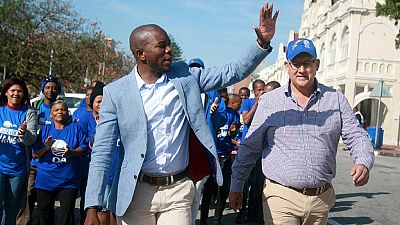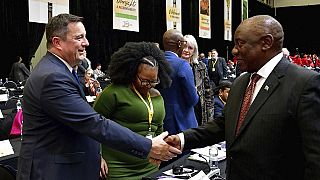South Africa
The voting pattern in South Africa is changing, according to the leader of the Democratic Alliance (DA), Mmusi Maimane, whose party caused a major upset to the ruling African National Congress (ANC) in the recently held municipal elections.
The ruling ANC lost its majority in key states including the economic capital, Johannesburg, the symbolic Nelson Mandela Bay and Tshwane, the municipality that is home to the capital, Pretoria to the Democratic Alliance.
The losses are the biggest suffered by the ANC which has ruled the country since the end of apartheid.
The ANC which has long ridden on the back of its liberation struggle to end minority white rule in the rainbow nation, nonetheless, still has majority support across the country.
But Mmusi Maimane believes the results from the municipal elections indicate an end to the era of South Africans voting along racial lines, especially since his party is often described as one for wealthy white South Africans.
“Now they can sit back and understand that they can’t just go out to voters and tell them because you are black you must vote for us. They can’t go to voters and say, we will govern, as they’ve said, until Jesus comes back,” Maimane said.
For Maimane, the “debate for the people of South Africa” has moved on from race. “It is about governance models,” he said adding that the ANC “can’t just sustain the argument that says to them they will always just have South African electorates, just because they are the ANC.”
The ANC’s campaign in the build up to the municipal election was focused on its contribution to ending the apartheid regime 22 years ago.
But that message it seems has lost its ability to swing voters to their fold especially as ordinary South Africans have more pressing issues like youth unemployment which is at 29 percent. That aside, president Jacob Zuma has courted so much controversy personally which have rubbed off on the party, making it unappealing to many voters.
The DA, political analyst Prof. Sipho Seepe said “ran a very good campaign” ahead of the municipal election.
“One of the things that they had was a message – a narrative. And that narrative was two ways. One was to exploit weaknesses of the ANC, especially issues that had to do with cadre deployment and even the ANC itself has come to terms with the cadre deployment because when it went into these elections, although it didn’t do well, it did say we want the communities to select people who they have faith in and confidence.”
Another weakness in the ANC machinery Prof. Seepe noted was the internal wranglings.
“You had a party that was limping towards the elections and most importantly they did not have a narrative. They got so embroiled in their own internal issues and when you go to war, a party that is divided does not win.”
Having won 43.11 percent of votes in Tshwane, the DA is expected to form a coalition government there, something the party’s mayoral candidate Solly Msimanga says has already been activated as talks are underway and should be concluded before the end of the week.
“We’re not desperate to get into government in a way that compromises our ability to govern. So we’re working hard to make sure that those negotiations are actually serving to the people at home” Maimane said of coalition talks engaged in by his party.
“The initial phases have started, some draft agreements will probably come into play and if we don’t come to an agreement on that, we’ll see how we go from there.”
As South Africa’s political scene begins to evole, Maimane says people should give up the idea that “it must be about the party or the role of the individuals concerned but rather about the people”.
And if the recent elections are anything to go by, politicians would also have to change their approach to politics.
“What will be required now is a re-alignment of politics that will in fact mean that people can work together, sometimes across ideological lines to accelerate the project, that very project that you can’t have one party dominance thing, but rather it’s better for us to have a competitive democracy – where people can choose, and power can shift from one party to the next without fear and intimidation.”
Mmusi Maimane believes it is possible to further reduce the ANC’s share of votes in the 2019 national elections to below 50 percent thereby giving the Democratic Alliance a chance to rule in a coalition government.














Go to video
Former South African deputy president David Mabuza dies at 64
01:09
Guinea presents draft for new constitution, referendum set for September
Go to video
African gut study reveals urbanization threatens microbial diversity
01:35
Edgar Lungu's family condemns court decision to stop private burial in South Africa
00:52
South African court halts burial of Zambia’s ex-president Edgar Lungu